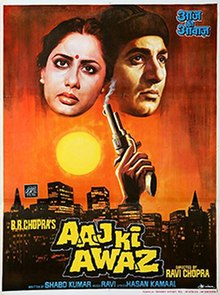Aaj Ki Awaaz
| Aaj Ki Awaaz | |
|---|---|
 | |
| Directed by | Ravi Chopra |
| Produced by | B. R. Chopra |
| Starring | Raj Babbar Smita Patil Nana Patekar |
| Music by | Ravi |
| Distributed by | B. R. Films |
Release date |
|
| Country | India |
| Language | Hindi |
Aaj Ki Awaaz (Urdu: آج کی آواز; English: Voice of the day) is a 1984 Bollywood action drama film produced by B. R. Chopra and directed by Ravi Chopra.[1] The film stars Raj Babbar, Smita Patil, Nana Patekar, and Vijay Arora. The film's music is by Ravi. The film is based on 1974 Hollywood movie Death Wish. This film was remade in Telugu in 1985 as Nyayam Meere Cheppali, in Tamil in 1985 as Naan Sigappu Manithan and in Kannada as Mahatma.
The censor-board certificate of the movie shows 'Re-revised', implying that censor board objected to certain scenes of the movie, and cleared the movie when it was edited in 2 stages. The censor board was severely criticized for passing gory rape scenes in BR Chopra's 'Insaaf ka Tarazu', which released 4 years back in 1980, and thus taking lesson from it, it didn't pass the gory scenes in 'Aaj ki Awaaz', and asked the producer to revise, and further edit out the material they said was objectionable. It was indeed wrong on the part of producer to film such scenes and present them on celluloid screen.[2][3]
Plot (SpolierAlert)
Professor Prabhat Kumar Varma (Raj Babbar), lives with his widowed mom, and sister, Madhu (Raksha Chauhan), in Andheri, Mumbai. He is worried about the growth of crime in the city. To complain some of the goons of his area, he met Police Commissioner Sathe (Chandrashekhar). The commissioner took a note of this and deputed an Inspector to look into this matter. In another incident Professor Lalwani (Dheeraj Kumar)'s sister-in-law, Sudha (Sonika Gill), is abducted, raped and killed. Her rapist and killer, Suresh Thakur (Dalip Tahil), is arrested and presented in court. In the hearing of the case Suresh and his lawyers proved that at the time of the incident, he was not in Mumbai. The court subsequently acquitted him. Prabhat made a vigilante group with some other people of the area and chased criminal elements out of their area which brought him into the notice of the area's don Jagmohandas (Nana Patekar), uncle of Suresh Thakur.
Jagmohandas tells Suresh to teach a lesson to the professor and break him mentally. Suresh with his gang barged into the house of Prabhat Kumar and after tying him in a chair and killing his mother, raped his sister in front of his eyes. His sister jumped from the building out of the humiliation she faced and died. Having lost confidence in the Police and Judiciary, Prabhat lies to the Police that the raiders had assaulted him to unconsciousness and he could not see their faces. To take revenge, Prabhat himself started killing criminals and rapist of the city secretly. Very soon the police was on alert and Inspector Shafi (Shafi Inamdar) was given the enquiry.
Inspector Shafi caught Prabhat and he was presented in the court where her girl friend Rajni (Smita Patil) fought his case and proved that there were two sides of the crime Prabhat committed.
Cast
- Raj Babbar as Prof. Prabhat Kumar Varma
- Smita Patil as Public Prosecutor Rajni V. Deshmukh
- Nana Patekar as Jagmohandas
- Om Shivpuri as Judge
- Dheeraj Kumar as Prof. Lalwani
- Shafi Inamdar as Inspector Shafi
- Vijay Arora as Srivastava
- Arun Bakshi as Inspector Veerkar
- Ashalata as Mrs. V.V. Deshmukh
- Chandrashekhar as Police Commissioner Sathe
- Iftekhar as Judge V.V. Deshmukh
- Alok Nath as Hotel (bar owner)
- Gufi Paintal as Orderly in Mental Hospital
- Dalip Tahil as Suresh Thakur
- Dinesh Thakur as Advocate Dayal
- Bashir Khan as Prabhat's student
- Chandni as Sudha's friend
- Deepak Qazir as Kishan Khanna
- Sonika Gill as Sudha Advani
- Urmila Bhatt as Mrs. Varma
- Raksha Chauhan as Madhu, Prof. Prabhat's sister who gets raped and killed.
Crew
- Director: Ravi Chopra
- Producer: B. R. Chopra
- Banner: B R Films
Music
| Song | Singer (s) |
|---|---|
| "Aaj Ki Awaj" | Mahendra Kapoor |
| "Dil Hi Dil Main" | Mahendra Kapoor |
| "Mera Chhota Sa Ghar" | Mahendra Kapoor |
| "Bharat To Hai Azad" | Mahendra Kapoor |
| "Mera Chhotasa Ghar" (sad) | Mahendra Kapoor |
| "Shloka" | Hemant Kumar |
| "Saare Jahan Se Achcha" | Vijaya Majumdar |
Awards
| Year | Nominee / work | Award | Result |
|---|---|---|---|
| 1985 | Hassan Kamal (for title song) | Filmfare Best Lyricist Award | Won |
| Smita Patil | Filmfare Award for Best Actress | Nominated |
References
- ^ Saibal Chatterjee; Gulzar; Govind Nihalani (2003). Encyclopaedia of Hindi cinema. Popular Prakashan, Encyclopædia Britannica (India) Pvt. Ltd. p. 541. ISBN 978-81-7991-066-5.
- ^ https://www.indiatoday.in/magazine/society-the-arts/films/story/19801130-insaaf-ka-tarazu-b.r.-chopra-uses-all-the-stale-bombay-filmi-cliches-and-symbolisms-821642-2014-01-02
- ^ https://www.dnaindia.com/bollywood/report-evolution-of-the-rape-scene-2520956
External links
- Aaj Ki Awaaz at IMDb
- 1984 films
- Indian films
- 1980s Hindi-language films
- Films scored by Ravi
- Films directed by Ravi Chopra
- Hindi films remade in other languages
- Indian courtroom films
- Indian rape and revenge films
- Indian vigilante films
- Films about rape in India
- Hindi-language action films
- 1980s vigilante films
- 1980s Hindi-language film stubs
